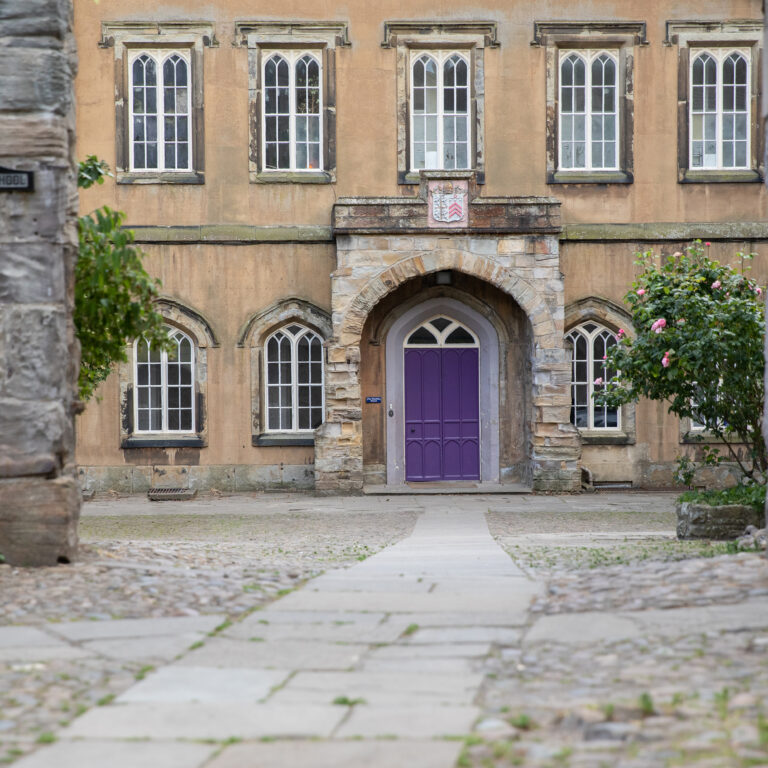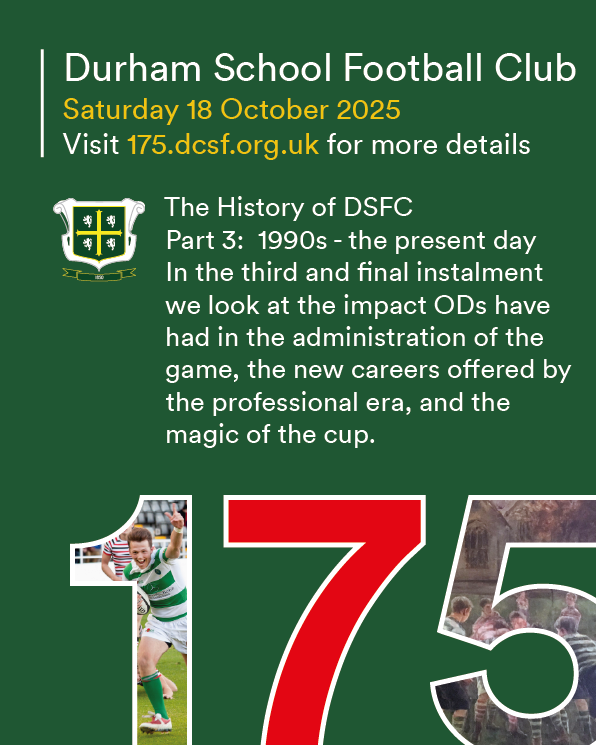
175 Years of the Development of Rugby at Durham School
As we approach our 175th Anniversary Celebrations on Saturday 18 October 2025, Development Director Andrew Beales and Archivist George Gardner take a look back across Durham School Football Club’s long history. DSFC is one of the world’s oldest rugby clubs. In our final piece on the history of DSFC we look at some of the figures from the Durham School community who had an impact on the administration of the game at a national level, the professionalisation of the game, and the bright future that awaits current pupils as we raise our eyes to the 200th Anniversary of DSFC in 2050!
ODs at the Very Top of the Game
The RFU, particularly during the game’s amateur era, relied on the counties to provide not only players but also administrators of the game. There were three presidents of the RFU from Durham in the 20th century. All of them had an association with Durham School.
First was Alderman H. Edwin Ferens. Edwin was a leading figure in North-East rugby and one of the game’s national administrators. Though not an OD himself, he was a supportive parent, and his son H. C. Ferens would become a famous OD and civic leader. A Durham City stalwart, he served Durham County Rugby Football Union as an official and appears alongside the county XV in period photographs, including Kent v Durham at Blackheath in April 1904 and the tour match against South Africa at Hartlepool in October 1906. He rose to the highest office in the sport as President of the Rugby Football Union for the 1925 to 1926 season.
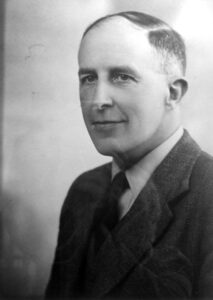
Second was Eric Watts Moses (S, 1909–14). After playing rugby at school for Durham before WWI, on returning from service as a young officer in the East Yorkshire Regiment, he played for Sunderland RFC and went on to take on the role of honorary secretary of the club. He was also the joint editor of the War Record of Old Dunelmians (1919), showing his deep connection with Durham School. From 1926 to 1950, he became a key figure in Durham County administration, representing Sunderland RFC and serving on national rugby boards. In 1936, he co-authored an accessible history of the Durham County Union, highlighting his deep engagement with county rugby. Elevated through the ranks of the Rugby Football Union, he served as RFU President in 1949–50, during which he championed youth development, encouraging players to “become attack-minded and think for themselves”. He pushed for stronger international links, especially with the Southern Hemisphere and Australia. After his presidency, as the RFU’s “Scribe of the RFU”, he helped remodel the laws of the game, authored a respected history of the International Rugby Board, and returned to Sunderland to pioneer coach training courses.
Finally, G. Tarn Bainbridge (P, 1930-33) played rugby at Durham School and joined the 1st XV in 1933. After leaving school, he continued to play with distinction for Darlington RFC and soon became recognised as a respected figure in the county game. Following service in WWII, he moved into rugby administration, serving his club and then representing Darlington on the Durham County Rugby Football Union Committee. His commitment and influence were acknowledged when he was elected President of Durham County RFU in the 1963/64 season. His career in administration reached its height when he became President of the Rugby Football Union for the 1975/76 season. During his presidency, he represented the game at major events, including the opening of new facilities at Darlington. Tarn Bainbridge is remembered as both a fine player and a distinguished leader in English rugby.
Other ODs have held significant positions in the RFU set up, including Tim Stirk (P, 1955-60), who was President of both Lancashire RFU and England Schools in the mid-2010s. Many other ODs have gone on from playing at county level to administration including Dr John Craven (P, 1950-56) who having played in the Second Row for Northumberland, went on to become president of Cheshire RFU.
Going Professional
The professional era, beginning in the mid-1990s, brought new demands and opportunities. Garath Archer (P,1990-92) earned twenty-one England caps between 1996 and 2000 and played at the 1999 Rugby World Cup. Central to Newcastle Falcons’ Premiership winning side in 1997 to 1998, he later lifted the Powergen Cup in 2004 in what proved his final professional match.
Noel “Shez” Shearing (L,1988-93) played for Durham School, England U16s and U18s as well as Durham City before moving to London, where he was tragically killed in a bus accident. His iconic No. 7 shirt now hangs in the changing rooms before 1st XV matches, and the annual fixture against Ampleforth is known as the Noel Shearing Cup in his memory. Others from this generation include David Roberts (S, 1986-91), who represented England Schools at U16 in 1990, and Simon Thompson (P, 1984-91) who played England Schools at U18 in 1991.
George Truelove (P, 1992-94) was one of the earliest ODs to have professional rugby success, playing on the wing under both Union and League codes. George played for Ballymena R.F.C., then Saracens F.C., Bedford, Coventry R.F.C. and Union Sportive Bressane in Rugby Union, and London Broncos, and the Wakefield Trinity Wildcats in Rugby League.
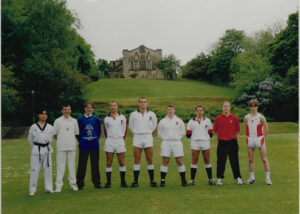
Howel Wong, England B Taekwon-do ,Fraser Watts, Scotland Cricket, Tom Burridge England and Great Britain U16 and U21 Ice Hockey,
Mark Olugbode – England A U16s Rugby, Lee Best – England U18s Rugby, David Willets – England A U16s Rugby, Jonathon Golightly U16s Rugby, Ian Shepheard – England Schools Swimming, Edwin James England Schools Cross Country and Grant Thompson England A U16s Rugby.
Michael Stephenson (P, 1992-99), a key figure in Durham’s strong late 1990s school sides, won two English Cups with Newcastle, gained England caps in 2001, then played for Bath and Leeds before retiring in 2013.
Lee Best (L, 1993-97) played fullback for Bristol, Bath, Richmond, La Rochelle, and Worcester Warriors. An England international, he had extensive England Schoolboy experience while at Durham. Lee was one of a number of pupils to play international sport in the mid-1990, as captured in this photograph.
Hall Charlton (C, 1993-98) played as scrumhalf for Newcastle Falcons, featuring in their victorious 2001 and 2004 Anglo-Welsh Cup finals. In 2004, he was called into the senior England squad against Canada, before later continuing his career with Blaydon RFC.
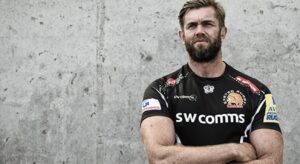
Michael Young (C, 2005-07) made more than two hundred appearances for Newcastle Falcons, had spells with Leicester, Bath, Gloucester and Toulon, represented England Sevens and scored the winning try against New Zealand in the 2009 London Sevens final.
James Isaacson (L,1992-98) represented Newcastle Falcons and Leeds Carnegie as a prop and hooker, winning promotion to the Premiership with Leeds in 2007. An England U21 international, he later coached at Life University in Georgia, guiding them to national success in 2011.
Craig Willis (S, 2011–13), fly half, played for Newcastle Falcons and Ealing Trailfinders, scoring over 1000 points in his professional career to date. As of 2025, he signed for French Pro side SU Agen Lot-et-Garonne.
After Durham School, Pierce Phillips (S, 2009-11) went through the Newcastle Academy system, represented England Counties, and had spells with Darlington Mowden Park and the Yorkshire Carnegie Academy before moving to the Channel Islands to join Jersey Reds, a side he went on to captain. He later played for Worcester Warriors in the Premiership, before spells at Agen, Edinburgh, and now Grenoble.
James Elliott (C, 2009–16), a product of Durham School and Durham City, was a well-honoured England School and Student international. He came through Newcastle’s senior academy before playing for Yorkshire Carnegie and then three seasons with Jersey Reds, helping them to the 2022–23 RFU Championship title and a notable Premiership Rugby Cup win at Bath. He re-joined Newcastle Falcons in October 2023.
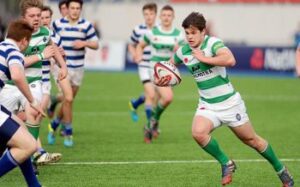
Adam Redman (P, 2010-15) captained the 1st XV on their Cup Run in 2013/14. Sadly, the side narrowly lost out in the semi-final to Warwick. Adam went on to play briefly for Newcastle Falcons before injury cut short his career. He now continues to fly high as an airline pilot.
Cameron Nordli-Kelemeti (S, 2013-18), born in Fiji and educated at Durham in the 2010s, was selected for England Under 18, came through the Newcastle academy, made his Premiership debut in 2018, and now plays in Major League Rugby with the New England Free Jacks.
Steele Barker (S, 2017-19) built on his 1st XV experience with time at Yorkshire Carnegie Academy, Exeter University, Penryn and Redruth before signing for the Cornish Pirates, for whom he made 35 appearances before moving to Premiership side Bristol Bears.
The Magic of the Cup
The RFU National Schools Cup has been the flagship schools’ competition at U15 and U18 level since 1991. Over the years it has grown to include the Vase, Plate and Bowl, ensuring that schools at every level of the game can test themselves on a national stage.
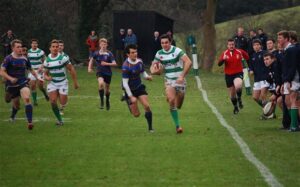
The competition begins regionally and builds towards the showpiece finals at Twickenham. As teams progress through the knockout rounds, the journeys become legendary—memorable road trips for players, coaches and supporters alike. Magic moments like this try from Jacob Bushnell in 2013 often make the national papers.
Durham School has enjoyed its share of Cup magic. In the early 2000s, under the guidance of the legendary Director of Sport, Paul Gerrard—known simply as “Chief”—the 1st XV reached the Cup Finals in both 2001 and 2006. More recently, the Green and Whites made the semi-final of the Cup in 2014, and in 2024 reached the semi-final of the Vase. The U15s have also made their mark, most notably in 2024 when they enjoyed a thrilling run all the way to the Vase Final.
The Cup continues to provide Durham teams, past and present, with the chance to create history—and unforgettable memories—on the national stage.
The Future
The continuity of the tradition remains striking. From the little red rule book carried by the Crombie brothers to the floodlit stages of the professional era, rugby at Durham, Choristers and Bow has linked skill with character and service. The pathway from school to international rugby is narrower than before, largely because professional players play longer, yet the flow of young talent from the Playground continues to enrich the game at all levels.
In recent years, younger Old Dunelmians and current pupils have regularly featured in England Under 18, Under 19 and Under 20 programmes, and as academy players at Newcastle Falcons. Among them, Paddy Hogg (C, 2010-25), George Bolam (P, 2018-25), Sam Graham (S, 2022-24) and the current 1st XV Captain, Ajay Edwards.
What distinguishes this history is not only the role of internationals, Barbarians and Lions, but the way rugby has formed men who went on to lead in education, the law, public service and beyond. From Brutton and Budworth in the Victorian era, through Aarvold and Brett between the wars, to Weston, Kingston and Parling in our own times, the shared tradition of the Foundation has been more than a succession of matches. It has been an education in resilience, teamwork and leadership, sustained across nearly two centuries. Rugby, and sport in general, is part of the success story of Durham Cathedral Schools Foundation, and continues to help our pupils, at whatever level they play, to develop confidence for life and respect for all.
Whenever we attempt to trace some history or other at Durham School, we do so with the knowledge that it is impossible to capture every name, every event, and every contribution. That is sadly part and parcel of being a centuries-old institution. Inevitably, some details will be overlooked and some individuals not mentioned, but this should never be taken as a dismissal of their part. This is as true for rugby as it might be for music, drama, rowing or cricket, so we apologise if someone is missed. Please do contact od@dcsf.org.uk with your questions and suggestions.
